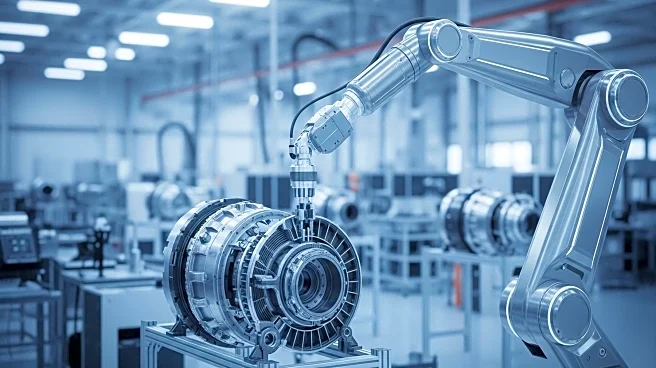What is the story about?
What's Happening?
Aerospace and defense industrial manufacturers are increasingly adopting AI, machine learning, and intelligent agents to tackle workforce shortages and skill requirements. These technologies are being used to accelerate onboarding and training processes for complex industrial roles, thereby enhancing productivity and safety. The application of digital tools is guiding frontline workers in real-time, reducing human error, improving safety protocols, and maintaining high-quality standards in aerospace manufacturing and maintenance environments. The industry is focusing on creating resilient, adaptive, and future-ready workforces by empowering employees with advanced tools to thrive in rapidly evolving operational contexts.
Why It's Important?
The integration of AI and machine learning in the aerospace sector is crucial for addressing the skilled labor shortages that have been exacerbated by increasing demand and technological advancements. By streamlining workflows and enhancing decision-making, these technologies are expected to significantly improve operational efficiency and safety standards. This shift not only benefits the aerospace industry but also sets a precedent for other sectors facing similar challenges. Companies that successfully implement these technologies stand to gain a competitive edge by optimizing their workforce capabilities and ensuring high-quality production standards.
What's Next?
As the aerospace industry continues to embrace AI-driven solutions, further developments in intelligent technologies are anticipated. Companies may invest more in research and development to refine these tools, potentially leading to broader adoption across other industrial sectors. Stakeholders, including industry leaders and policymakers, might focus on creating supportive frameworks to facilitate the integration of AI in workforce management. Additionally, ongoing training and development programs could be expanded to ensure employees are equipped to work alongside advanced technologies.
Beyond the Headlines
The adoption of AI in workforce management raises ethical considerations regarding job displacement and the need for continuous skill development. As machines take on more complex tasks, there is a growing need to address the potential impact on employment and ensure equitable access to training opportunities. Furthermore, the reliance on AI for decision-making processes necessitates robust cybersecurity measures to protect sensitive data and maintain operational integrity.















